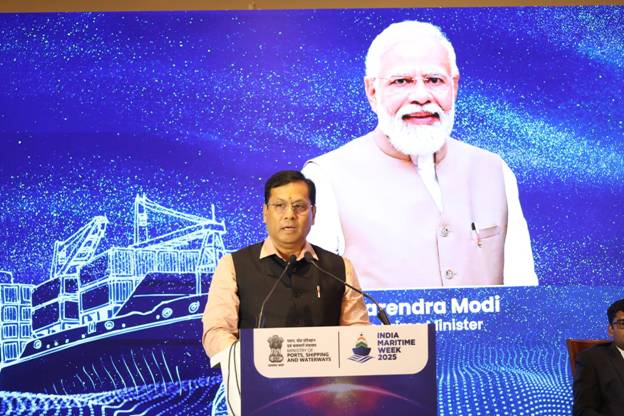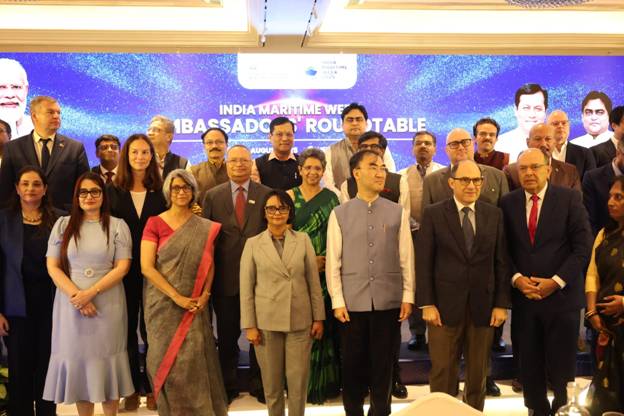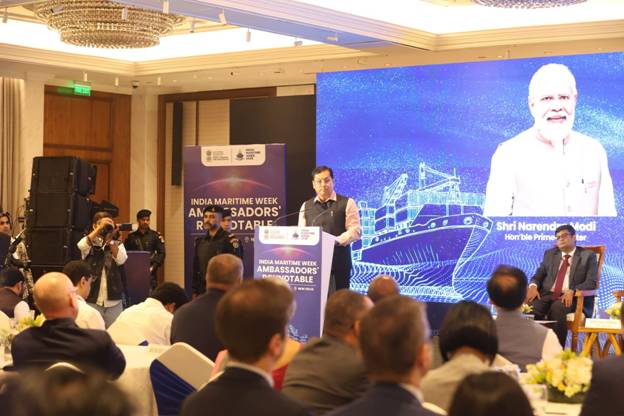Global Powers Seek Maritime Partnerships with India; Envoys Discuss Investment and Blue Economy with Shri Sarbananda Sonowal
Global Powers Seek Maritime Partnerships with India; Envoys Discuss Investment and Blue Economy with Shri Sarbananda Sonowal
The Ministry of Ports, Shipping and Waterways (MoPSW) hosted the Ambassadors’ Roundtable Meet in Delhi today, convening envoys from 28 nations along with senior officials, industry leaders and multilateral representatives to discuss collaboration ahead of India Maritime Week (IMW) 2025, scheduled for October 27–31 in Mumbai.
The event, chaired by Union Minister for Ports, Shipping and Waterways Shri Sarbananda Sonowal, underlined India’s growing role in global maritime trade, sustainable shipping and the blue economy. Shri Sonowal urged global partners to view India as a hub for investment and innovation, highlighting the government’s $1 trillion maritime investment roadmap.
“India’s maritime journey is entering a new chapter under the vision of Prime Minister Shri Narendra Modi. With transformative initiatives such as Maritime India Vision 2030 and Maritime Amrit Kaal Vision 2047, our ports, shipping and logistics ecosystem is becoming more resilient, sustainable and future-ready,” Union Minister Shri Sarbananda Sonowal told the gathering.
Underlining the opportunities in India’s maritime sector, Shri Sarbananda Sonowal further said, “Under the dynamic leadership of PM Shri Narendra Modi ji, we are working to transform our ports, shipping, and logistics ecosystem into one that is resilient, sustainable, and future-ready, and this opens vast avenues for international collaboration. These opportunities open up a 1 trillion US dollars maritime investment roadmap, with strong potential for joint ventures in developing ports and cargo terminal operations, multi-modal terminals, maritime services, shipbuilding, ship recycling and ship repairs, green hydrogen hubs, and sustainable shipping solutions.”
Minister of State for Ports, Shipping and Waterways Shri Shantanu Thakur also addressed the session, underscoring reforms in port modernisation, inland waterways expansion, and green and digital shipping, and urged greater private sector involvement.
“Our Hon’ble PM Shri Narendra Modi ji has often emphasised that ‘Ports are not just gateways of prosperity, but gateways of India’s future.’ Guided by this vision, India is modernising its maritime sector so that it becomes a pillar of nation-building, technology adoption, and sustainable development. As the world realises this potential, India has seen remarkable momentum in maritime investments and partnerships. Global players are joining hands with Indian counterparts in shipbuilding, port modernisation, smart logistics, and green shipping. Technology is at the heart of this progress—AI-driven logistics, digital port operations, and automation are making our ports more efficient and globally competitive”, said Shri Shantanu Thakur.
A sectoral presentation by Shri R. Laxmanan, Joint Secretary, MoPSW, showcased opportunities in mega projects such as Vadhavan Port, Galathea Bay Transshipment Port and Tuna Tekra Terminal, alongside investments in green hydrogen hubs, LNG bunkering, shipbuilding, ship recycling, and maritime industrial parks.
The deliberations focused on India’s core maritime priorities, including strengthening shipbuilding capacity and port-led development to position the country as a global hub. Delegates also highlighted the scope of the blue economy, stressing sustainable growth and livelihoods through responsible use of ocean resources. Discussions emphasised digitalisation in maritime logistics to improve efficiency and transparency, along with the need to accelerate the transition to green shipping through hydrogen-powered and low-emission vessels. The role of IFSC-GIFT City in driving maritime financing was underlined as a key enabler to attract global investment and foster innovation in the sector.
Envoys welcomed the government’s reforms, including five new legislations — the Bills of Lading Act, Carriage of Goods by Sea Act, Merchant Shipping Act, Coastal Shipping Act and the Indian Ports Act — which replace colonial-era laws and align India’s framework with global best practices.
“IMW 2025 will be a platform where ideas can translate into projects, and commitments into partnerships. India stands ready to collaborate and lead towards a maritime future that is prosperous, sustainable and inclusive,” Shri Sonowal added.
The outcomes of the Roundtable will be integrated into IMW 2025, ensuring the biennial flagship event addresses global stakeholder priorities.



****